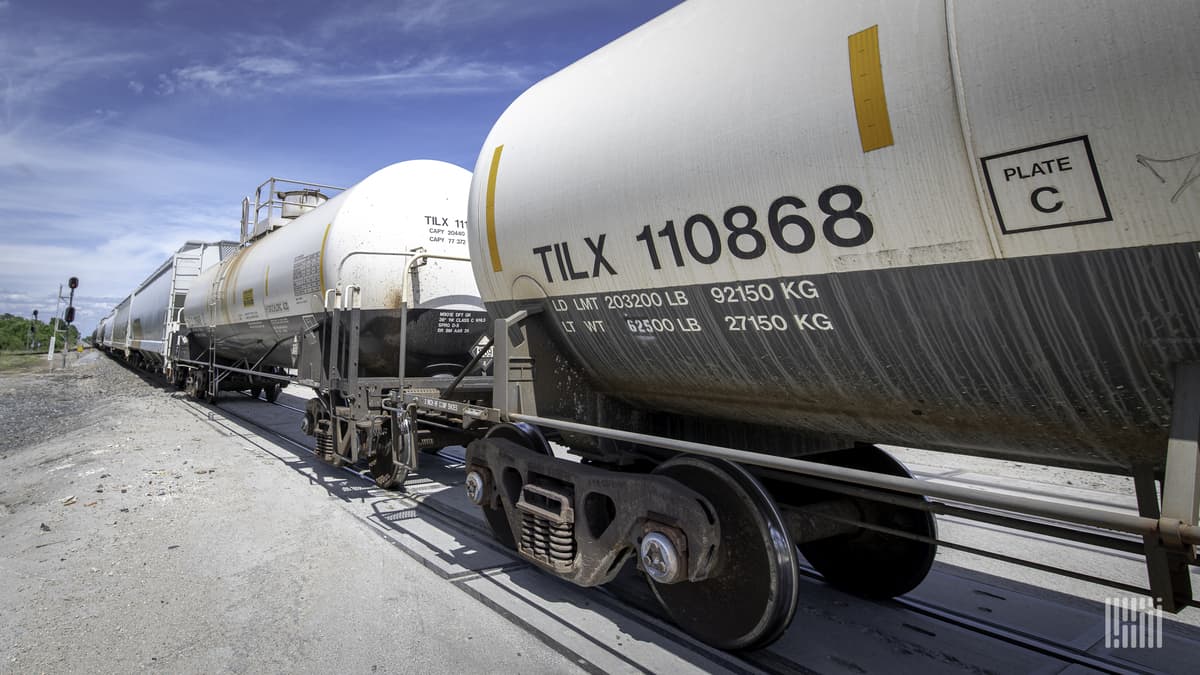Freight traffic disruptions at the U.S.-Mexico border due to high numbers of daily migrant crossings — as well as responses by state and federal officials to those crossings — prompted rail car manufacturer FreightCar America and rail car lessor and manufacturer Trinity Industries to lower their 2023 earnings guidance, executives from both companies said during recent earnings calls.
If the disruptions continue, expect impacts to fourth-quarter results as well, according to Trinity Industries President and CEO Jean Savage. Her company said it delivered 4,325 new rail cars in the third quarter, 685 fewer than projected, because of the closure of U.S.-Mexico border trade lanes by U.S. Customs and Border Protection in October.
“Additional congestion or closures will negatively impact our ability to get railcars across the border and may require us to slow down or temporarily suspend production,” Savage said in prepared remarks during Trinity’s (NYSE: TRN) third-quarter earnings call last Thursday. Trinity has a rail car production plant in Monclova, Mexico, about 152 miles south of Laredo, Texas. “We are working with the railroads and government agencies to do what we can to keep operations running smoothly for both inbound and outbound rail and truss track.”
As a result of the situation at the border as well as other supply chain challenges, Trinity lowered its 2023 adjusted earnings per share guidance to $1.20 to $1.35 from earlier EPS guidance of $1.50 to $1.70.
Moving rail car production to Trinity’s U.S. operations isn’t feasible because of the difference in production costs between the two countries, according to Savage. To account for uncertainties at the border, Trinity has brought materials into Mexico for car assembly as well as explored different routes and entry points to bring rail cars back into the U.S., Savage said.
“While rail traffic operations resumed on September 23, congestion and rail traffic challenges continue to evolve,” Savage said. “While we have started moving railcars again, we still have railcars temporarily sitting in storage and at our facilities, and we continue to evaluate available alternatives for rail and truck transportation between Mexico and the United States.”
Trinity reported third-quarter 2023 EPS of 29 cents, compared with 35 cents per diluted share for the third quarter of 2022. Adjusted EPS was 26 cents versus 34 cents a year ago.
FreightCar America President and CEO Jim Meyer also said the disruptions from migrant crossings had caused the company to limit rail car shipments in the third quarter. The company lowered its fiscal 2023 guidance for revenue to $365 million to $380 million, based on forecast production of 3,150 to 3,300 rail cars, because of continued concerns over rail service disruptions, Meyer said. The company previously forecast 2023 revenue of $400 million to $430 million.
“We experienced, obviously, a level of disruption in the third quarter [that] has not abated itself. It has sort of ebbed and flowed. We’re hoping to get this thing behind us as quickly as we can, but our guidance adjustment, our top-line guidance adjustment is based on what we think might happen, based on the ebbing and flowing of this,” Meyer said during FreightCar America’s (NYSE: RAIL) earnings call on Tuesday.
The executives’ comments follow embargoes that took place on the networks of Union Pacific and BNSF in September. Both Class I railroads placed embargoes because CBP had closed train traffic at the Eagle Pass Gateway at the U.S.-Mexico border because of the migrant crisis. Gateways at other border crossings such as El Paso, Texas, also became stressed from the additional traffic.
Meyer said FreightCar America completed the fourth production line at its Castaños, Mexico, manufacturing campus during the third quarter, with the first deliveries from this line anticipated in the fourth quarter. The completion of the fourth line will bring the company’s total annual production capacity to 4,000 to 6,000 rail cars.
“Although weakness in freight loadings, the migrant issue at the border, and the overall macro environment continue to pose market uncertainties, we agree with industry forecasts of railcar deliveries of approximately 45,000 railcars in 2023,” FreightCar America Chief Commercial Officer Matt Tonn said. FreightCar America reported net income of $3.2 million and adjusted net income of $176,000 in the third quarter of 2023, compared with a net loss of $17.8 million and an adjusted net loss of $5.4 million in the third quarter of 2022.
“Our sales pipeline remains strong, with customer inquiries indicating that demand is still largely tied to railcar replacements across a diversified range of car types. Order activity by customer segment, including lessors, shippers, and Class 1 railroads, has remained consistent and includes the development of new customers who value our commercial proposition,” Tonn added.
Subscribe to FreightWaves’ e-newsletters and get the latest insights on freight right in your inbox.
Click here for more FreightWaves articles by Joanna Marsh.










